Iranian Christian Protest Violation Of Their Rights To Work
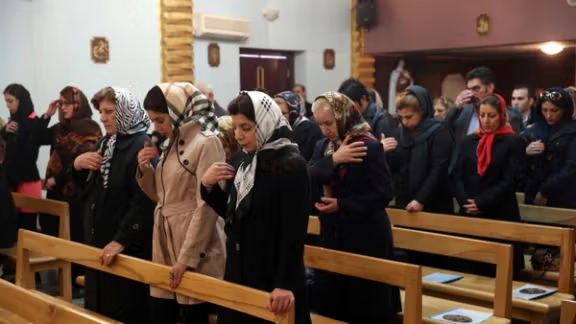
A group of Iranian Christian converts issued a statement on Sunday in protest to the Islamic Republic’s violation of their rights to work, even in private businesses.

A group of Iranian Christian converts issued a statement on Sunday in protest to the Islamic Republic’s violation of their rights to work, even in private businesses.
In their statement published by the United States-based Human Rights Activists' News Agency (HRANA), they said the Islamic Republic authorities seek to impoverish and isolate them from society.
“The Islamic Republic has deprived Persian-speaking Christians of the right to work and employment”, they said, bemoaning the serious obstacles the authorities have created for their employment and self-employment that have left them with no job opportunities.
They said the measures taken against them contradict Iran’s the international obligations and even the Islamic Republic’s constitution.
While Iran persecutes followers of the Baha’i religious community and rejects esoteric philosophies and cults, the constitution recognizes Christianity, Zoroastrianism and Judaism – whose members have official representatives in parliament. However, churches that are allowed to operate are ethnic Christian congregations, such as Armenians and Assyrians.
These established churches are discouraged from accepting new members, and there is official suspicion of evangelical, millenarianist Protestant sects that hold services in Persian. Renouncing Islam is forbidden by Sharia and the punishment could be death, although the government in Iran pursues lesser punishments.
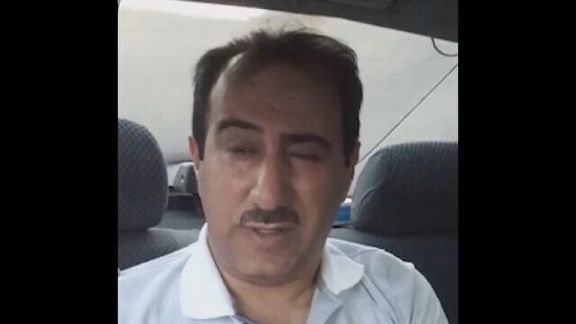
Nearly total silence reigns in Tehran over Israeli media's claim that the Mossad apprehended and interrogated a Revolutionary Guard agent at his home in Iran.
A short audio recording was published by Israeli media on Saturday with a photo of a man introduced as Iranian national Mansour Rasouli, 52. In the audio recording, Rasouli says he was sent to Turkey by the Revolutionary Guards (IRGC) to establishing an operational network to assassinate an Israeli diplomat in Istanbul, a Germany-based US general, and a journalist in France.
The audio recording surfaced hours after Iran International's report of the alleged Iranian triple assassination plot. Iran International's diplomatic sources said a member of the IRGC'S Qods Force had been detained in an unnamed European country for assassination plots in Germany, France and Turkey.
Apparently duped by his interrogators' claim that they were from one of Iran's many intelligence bodies, Rasouli says in the recording that accepting to carry out the operation was a mistake that he will never make again.
Israeli television channels including Channel 12 which broadcast the recording, without providing a source according to The Times of Israel, claimed it was made by Mossad operatives posing as Iranian secret service at Rasouli's home in Tehran but did not hold him after the interrogation. The newspaper also said Hebrew-language outlets had reported that some Israeli officials had confirmed earlier reporting of the plot by Iran International on Saturday.
Channel 12 news added, also without citing a source, that the Shin Bet security agency — which generally operates within Israel — also participated in the detention in Iran.
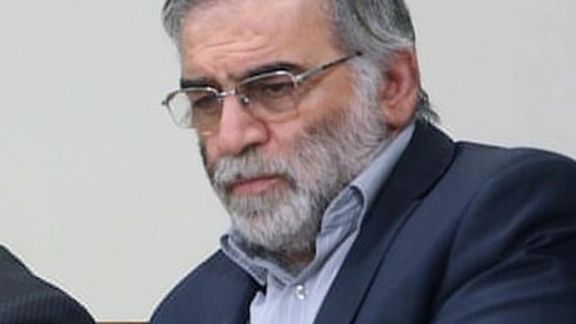
Iranian media, except the semi-official Mehr news agency and hardline Mashregh news website that have made very brief references to a Haarez report on the foiled plot to assassinate an Israeli consulate worker in Turkey, have remained silent about Iran International's report and the audio recording shared by Israeli media.
Iranian, Israeli, and Turkish officials have not made any comments about the reports of the alleged assassination plots.
It is not clear whether Rasouli, whose current whereabouts are not known, and the operative that diplomatic sources said had been detained in Europe are the same person or different agents involved in the same operation.
Israel has allegedly carried out dozens of operations and assassinations inside Iran, including the assassination of Iran's top nuclear man and senior IRGC member Mohsen Fakhrizadeh in November 2020 for which it has never officially taken responsibility. Ex Mossad Chief Yossi Cohen in June 2021 strongly suggested Israel was behind attacks on Iranian nuclear facilities.
Referring to the theft of thousands of Iranian secret nuclear document in February 2018 from a warehouse near Tehran, Cohen said more than 20 Mossad agents were involved in the operation. He said the agents were not Israelis, adding that all of them are alive and some of them have already left Iran.
Following Cohen's remarks, former President Mahmoud Ahmadinejad who in the past few years has cast himself as an opposition figure, alleged that the highest-ranking Iranian intelligence official in charge of countering Israeli spies in Iran was himself an agent of Israel.
Ahmadinejad did not name anyone nor specify the time period in question but attributed the success of Israel's intelligence operations in Iran to the high level of Tel Aviv's influence and infiltration in the Iranian intelligence and security agencies.
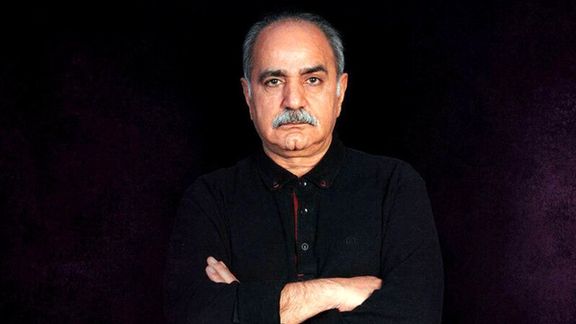
An Iranian film screening in Los Angeles became the scene of confrontation between some diaspora activists and actors accused of being regime-sponsored artists.
Some Iranian activists bombarded Parviz Parastui, the lead actor of the film, with questions about his political stances during the Q and A that followed the screening of One Thousand and One Day at 'Red Carpet with Parviz Parastouei' at Lumiere Cinema in Los Angeles on Wednesday.
Activists said Parastui who has appeared in more than fifty Iranian films never speaks about "human rights violations in Iran" and "regime atrocities" such as the killing of hundreds of protesters in nationwide protests in November 2019.
They also criticized him for his praise of the Revolutionary Guards (IRGC) Qods Force Commander Ghasem (Qasem) Soleimani who was killed in a targeted US drone strike as he arrived at Baghdad airport on January 3, 2020.
Parastui who has on some occasions criticized the clerics in power for corruption refrained from directly answering the questions on his relationship with Soleimani but implied that he could not speak freely and said he always feels as if he is walking a tightrope "to keep everyone happy."
Before the event, Sam Rajabi, a former judoka champion who now lives in the US, insisted that Parastouei explain about his relationship with Soleimani, while filming him on his mobile. Parastui refused to respond, and the encounter ended in Parastui knocking the mobile out of Rajabi's hand. The video taken by Rajabi has gone viral on social media with hundreds commenting in support or against Parastouei.
There was also a heated argument between a group of activists and Gohar Kheirandish, an Iranian actress who spoke in Parastui's support outside the venue of the event.
"Mr Rajabi has democratically and in an acceptable tone asked a question … and faced physical violence," one of the actor's critics said in a tweet while accusing the veteran actor of being a "government-sponsored" artist.
It is the duty of an artist who has found fame and money because of people's support to speak up and take people's side when they are oppressed, another critic argued on Twitter.
Some others have defended the actor saying being an outspoken critic is not easy for those living under an oppressive regime. "Sam Rajabi definitely knows that Parviz Parastui and Gohar Kheirandish are neither pro-regime revolutionaries nor super-religious," one of Parastouei's supporters tweetedwhile arguing that activists' demands for candid expression of artists' political views puts them in danger.
Yet others have questioned the US government about granting visa to a "Soleimani supporter".
Hardline Iranian media, such as the IRGC-linked Fars news agency, have alleged that the opposition Mujahedin-e Khalq Organization was behind the confrontations with Parastui and Kheirandish. But regime opponents of different persuasions have criticized the event as a publicity stunt in support of the Islamic Republic
Directed by Habib Ahmadzadeh, One Thousand and One Day -- also known as the Legend of Bonasan: The Genie in the Lamp -- is the story of a genie that must compose a melody with help from four humans to create a human miracle or he would be expelled from the Solar System for eternity and according to its director, is a film in praise of peace.
The Iranian Cinema US Tour organized by Code Pink included screenings and discussions in Washington DC, New York, San Francisco and Los Angeles in April.
Code Pink introduces itself as a women-led grassroots organization "working to end US wars and militarism" and supporter of peace and human rights initiatives. Code Pink condemns US sanctions on Iran.
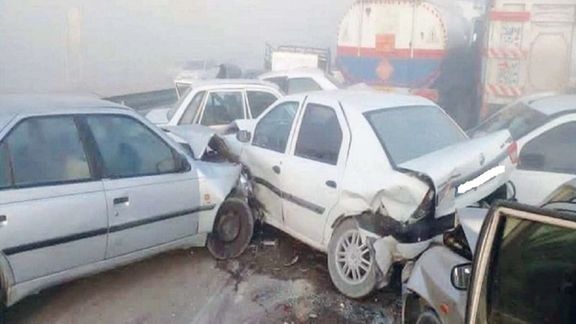
Parliament speaker Mohammad Bagher Ghalibaf has criticized the quality of Iranian cars and called for more imported vehicles.
In a parliamentary discussion Saturday, Ghalibaf said that “a car with good quality can be imported” for $5,000 whereas the Iranian version of a Kia Pride, the cheapest and most popular car on the market, costs about around $8,000 (2 billion rials). But it is the parliament and the government, controlling foreign currency, who have not approved additional car imports.
Since the United States introduced ‘maximum pressure’ sanctions in 2018, threatening third parties dealing with the Iranian financial sector, Iran has struggled with imports, while European carmakers in joint projects have withdrawn.
Iranian automakers are also quasi-governmental companies, benefitting from favorable borrowing and lack of competition. Some media in Iran have speculated that this vested interest might have a role in blocking approval for imports.
Parliamentarian Ali Babai Karnami bemoaned an “unrestrained situation” in the car industry. “Who is responsible for the rising car prices?” he asked. “What does the industry ministry do? Shouldn't the parliament monitor [the market]?..The situation of the car market is unbearable and has also had a detrimental effect on the prices of basic goods.”
Earlier in the month, the deputy head of Iran's traffic police Teymour Hosseini claimed domestically-made cars were more liable to fatal accidents and blamed their low quality on a monopoly held by Iranian automakers.
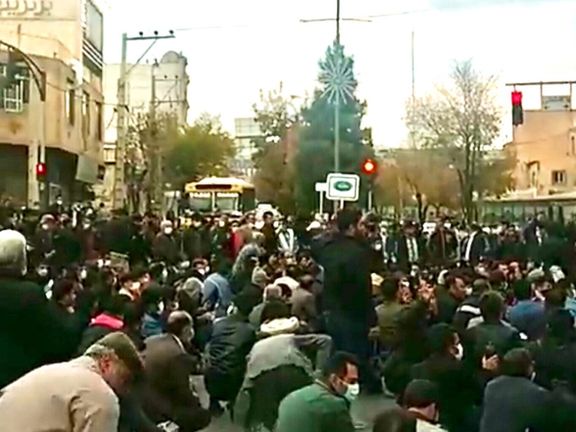
At least four union activists were arrested on the eve of another round of nationwide protests scheduled to be held on Labor Day, May 1, by Iranian teachers.
The Coordination Council of Iranian Teachers’ Trade Associations said that security officers raided the homes of the several activists in Tehran on Saturday, arrested four and confiscated their electronic devices.
The spokesman of the association, Eskandar Lotfi, said in a tweet that three of the detainees were taken to the notorious Evin prison, adding that tens of their other colleagues from different parts of the country have been summoned to court.
According to reports, the officers used violence against some of the activists who resisted arrest, including Rasoul Badaghi, and broke glasses and furniture with a hammer.
During the latest round of nationwide rallies, demonstrators gathered in front of the Education Ministry building in Tehran on Thursday and its offices in various other cities to protest discriminatory regulations on a teacher ranking plan as well as the "continuous and systematic" suppression of union activists.
Teachers across Iran have staged several nationwide protests and strikes in the past six months and have vowed to continue protests until authorities meet their demands including, the implementation of decade-old legislation that would bring the salaries and pensions of 750,000 teachers in line with other civil servants.
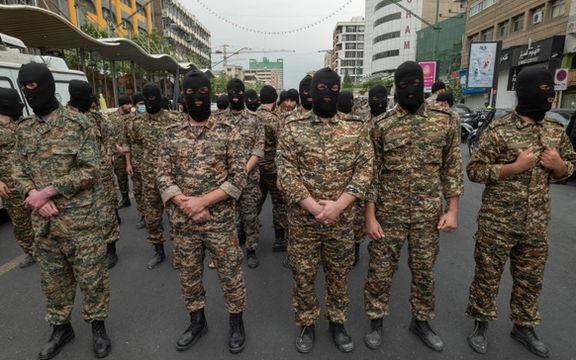
An operative of Iran's IRGC Qods Force held in a European country has admitted to plotting assassinations in Turkey, Germany and France, diplomatic sources say.
The sources who spoke to Iran International on condition of anonymity said the accused who is currently in detention in a European country has admitted to receiving $150,000 for organizing the assassinations with one million promised to be paid to him after the completion of the operations.
The alleged operative has confessed, the sources said, that he was ordered to organize the assassination of an Israeli national who worked at the Israeli consulate in Istanbul, an American general in Germany, and a French journalist.
The identities of the alleged targets and the reason for them being targeted have not been revealed.
Israel’s Haaretz reported following the disclosure by Iran International that Mossad played a role in preventing the assassination of its consulate worker in Turkey.
The revelation comes at a sensitive time when talks to restore the 2015 Iran nuclear deal, JCPOA, have stalled becuase of Tehran's demand that the United States shoudl remove the IRGC from its list of terrorist organizations.
IRGC working with drug cartels
Mohsen Sazegara, a United States-based journalist and political activist, told Iran International that there is a possibility the plots were connected to the Islamic Republic's promise to take revenge against the United States for the 2020 assassination of Qods (Quds) Force Commander Ghasem (Qasem) Soleimani, given that one of the targets of the alleged plots is said to have been an American general.
Soleimani was killed in a targeted US drone strike as he arrived at Baghdad airport on January 3, 2020. Iranian officials have repeatedly vowed to avenge his death.
The sources also said the accused has admitted that he had orders to use drug trafficking contacts to carry out the assassination missions.
Sazegara who was among the founders of the IRGC in 1979 and served in several high government positions in the early years of the Islamic Republic also said that Iranian operatives' use of drug traffickers to carry out operations abroad is not new. "For a long time, the Islamic Republic has worked with drug traffickers. The network of drug trafficking-terrorism extends from Kabul to Caracas," he said.
A special IRGC unit
Diplomatic sources who spoke to Iran International also said the man in charge of the alleged assassination plots was a member of the secretive Unit 840 of the Qods Force. The unit’s mission is to conduct operations against Western targets and Iranian opposition groups and individuals.
There is no mention of Unit 840 in Iranian media. The existence of a such a unit has only been reported by Israeli media which in November 2020 reported that Israeli Defense Forces (IDF) had accused Unit 840 of placing explosives on Syrian border.
Ali Afshari, political analyst based in the United States, told Iran International that in his view the IRGC has evolved into a "gangster, mafia-like organization" from an originally "idealistic Shia Islamic fundamentalist entity."
"The IRGC uses drug traffickers and criminal gangs to be able to avoid being held directly responsible for its terrorist operations," Afshari said.
In December 2020 Turkish intelligence said it had discovered a terror network tied to Iran’s Intelligence Ministry that would abduct or assassinated Iranian dissidents. According to Turkish government's official TRT channel, the network and its 11 operatives were behind the abduction of Farajollah Chaab, the former leader of an Iranian Arab separatist Movement.
Iranian intelligence allegedly lured Chaab to Turkey, abducted him, and with the help of an international Turkey-based drug cartel known as the Zindashti Cartel whisked him to Iran where he was later put on trial.
In 2013 the United States sentenced Iranian-American Manssor Arbabsiar to 25 years in prison. Arbabsiar, a car dealer, admitted to plotting the assassination of the Saudi ambassador to Washington on orders from Iranian military officials. Arbabsiar was arrested after the FBI and US Drug Enforcement Agency became suspicious of his visits to Mexico and contacts with a Mexican drug cartel.